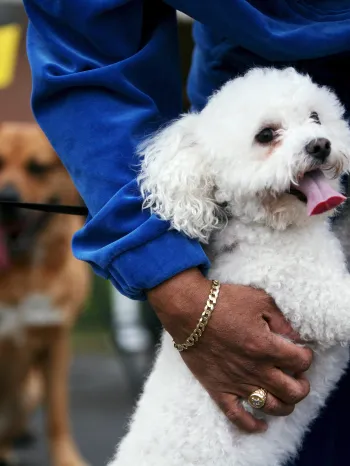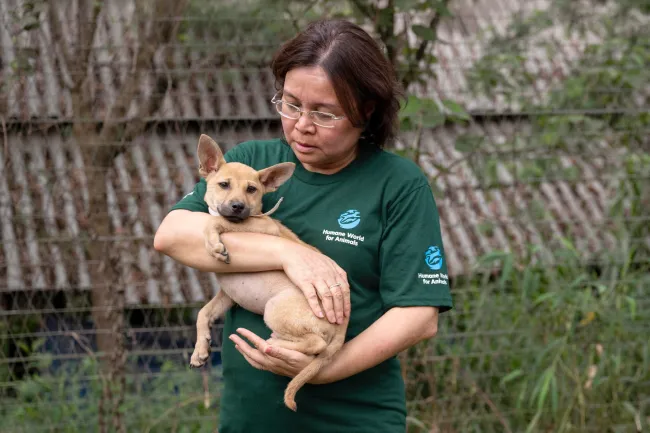At Humane World for Animals, we are committed to building a stronger, more inclusive animal protection movement—one where all people, across all communities, feel a sense of belonging and connection to our mission.
Through our global community-building efforts, we aim to create spaces where the rich traditions, values and lived experiences of people are honored and reflected in our work. We recognize that cultural identity, regional differences and individual perspectives all play vital roles in how communities interact with animals and advocate for their wellbeing.
Through our commitment to inclusion and equity, we:
- Provide direct care services for people and pets in historically marginalized and underserved communities, ensuring equitable access to resources that strengthen the human-animal bond.
- Design culturally responsive outreach strategies and community-led program models that meet people where they are—respecting local traditions, values, and needs—and advocate for policies that increase access to pet care services for all.
- Foster leadership development by offering education and training programs that uplift future animal welfare leaders from all backgrounds, building an organizational culture where inclusion and belonging are a lived reality.
- Through welcoming community voices and embracing the many traditions, perspectives, and cultures that shape the human experience, we are growing a movement where more people—and more animals—can thrive, together.
We work to ensure that underserved communities have accessible care for their pets by providing a comprehensive support system through our global direct care programs. Through our U.S.-based work providing access to care and our efforts around the world, we address the inequity and lack of access to companion animal resources by providing services such as veterinary care, spay/neuter, grooming, behavioral training, pet fees/deposits for housing, pet supplies and more. Our programs operate in over 60 locations, across 50 countries and include major metropolitan areas, small towns, and rural and Native communities, serving thousands of animals and their families every year.
Pets for Life: Since 2012, Pets for Life has supported over 350,000 pets in underserved areas with more than 1.1 million services, including over $15 million in veterinary care. Our program has also distributed over $17 million in grants to local organizations around the country.
Rural Area Veterinary Services: Since 2002, Rural Area Veterinary Services has served more than 186,000 animals, providing over $35 million in veterinary services. Our program has trained nearly 16,000 veterinary professionals and students, who have volunteered more than 930,000 professional hours providing access to care services.
Chewy partnerships: We have been working with Chewy since the early days of the pandemic to deliver pet food and supplies to some of the most underserved areas in the United States. Chewy donates the inventory, and we ship it around the country to local partners who can distribute the much-needed pet resources to communities in need. To date, we have distributed almost $102 million worth of pet food and supplies, covering over $5.5 million in shipping costs.
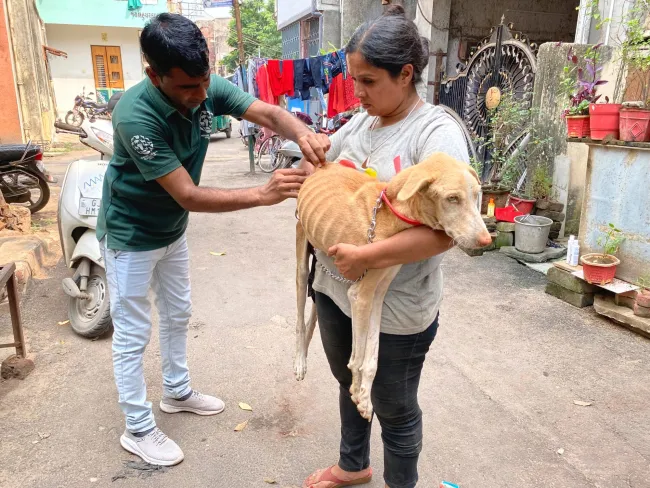
Manish Parmar/Humane World for Animals
Advancing the welfare of animals in more than 50 countries, we work around the globe to protect animals and promote the human-animal bond in under-resourced communities. These are just a few examples of our work.
Bolivia: Our veterinary training program in Bolivia is the first of its kind in Latin America, designed to improve access to high-quality spay/neuter services in under-resourced communities across the region. This program trains an average of 20 surgeons and 20 technicians a year. It sterilizes and vaccinates about 4,500 animals each year.
Canada: In collaboration with local partners, our Northern Dogs program provides free sterilizations, vaccinations, and emergency veterinary services through mobile clinics serving over 5,800 dogs and cats in remote Indigenous communities with limited access to veterinary care.
Chile: To date, our program offering affordable and accessible veterinary services has reached more than 45,000 animals in some of the most remote areas of the country. In addition, our disaster response team provided relief from recent devastating wildfires, caring for close to 500 animals and helping reunite displaced pets with their families.
Costa Rica: In the coastal village of Tortuguero, we are improving access to veterinary care while reducing negative interactions between domestic animals and local wildlife. Since 2024, our community-led program has served hundreds of animals and supports Tortuguero’s status as an animal-friendly community, with a new local registry now helping to monitor and manage the area's animal population.
India: Through our community engagement work, more than 35,000 people in under-resourced communities have brought animals for spay/neuter services. We have served approximately 30,000 animals per year through dog population management programs, mass vaccination campaigns and mobile veterinary clinics.
Mexico: We are implementing a new program pilot focused on training veterinarians in high-quality, low-cost spay/neuter techniques, providing preventative veterinary services via mobile clinics in five under-resourced communities, and conducting community outreach on responsible pet ownership and humane treatment of animals.
Romania: We work with local partners to provide spay/neuter services and lifesaving care to over 2,000 companion animals and preventive services to thousands more animals each year in shelters and isolated areas experiencing extreme poverty.
South Africa: Our Healthy Animals, Healthier Communities program in underserved communities has provided spay/neuter surgeries for approximately 1,500 dogs and cats, as well as preventive and wound care for an additional 2,000 animals, since December 2022. We also provide education on humane animal welfare and responsible pet ownership for 3,500 students and 30 teachers across six local schools.
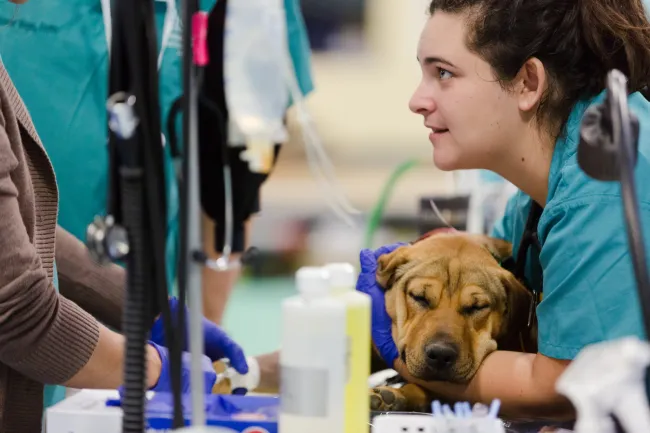
Shea Michelle
We are committed to advocating for policies that support underserved communities and their pets. Our policy work on access to care is focused in four strategic areas:
Pet-inclusive housing: Housing insecurity is an obstacle to pet ownership for many families and remains one of the primary reasons pets are relinquished to shelters. This has a disproportionate impact on low- and extremely low-income households. We are working to remove barriers and increase the supply of pet-inclusive housing with a focus on subsidized housing policies.
Veterinary telemedicine: Access to veterinary care is essential to increasing equity in pet care for underserved communities. Countless pets and their families live in areas with limited access to a veterinary hospital due to geographic location, limited appointment availability and other barriers. Increasing access to basic veterinary care via telemedicine could significantly alleviate this burden.
Building veterinary capacity: There is a national crisis in the veterinary profession with a shortage of qualified professionals that is predicted to worsen over time. This is likely to have a disproportionate impact on people and pets experiencing poverty and living in underserved areas. Several key policy areas to help mitigate this crisis include student loan forgiveness, increased utilization of veterinary technicians and team-based animal health care approaches, expansion of nonprofit organizations ability to provide care, and licensing reciprocity for veterinarians.
Ending breed-specific legislation: Breed bans are a major contributor to housing insecurity and crowding in animal shelters across the nation. They waste valuable resources and are notoriously ineffective in increasing public safety. We work to repeal breed-specific legislation in jurisdictions with breed bans, as well as advance policies that prohibit insurers from canceling, failing to renew or increasing premiums on homeowners and renter insurance policies based on the breed of the insured’s dog. We also advocate for breed-neutral policies in both private market and government-subsidized housing.
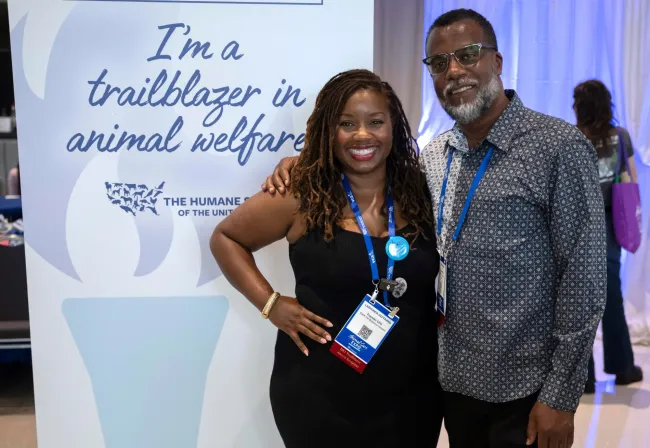
Darren Abate
We are weaving inclusion into all of our educational offerings and trainings to ensure our programming reflects the diverse communities we serve. We are committed to partnering with organizations to provide educational resources that address animal welfare issues from a culturally competent lens.
Spotlight on inclusion: We have developed a content category called "Spotlight on Inclusion" for our signature events, Animal Care Expo and Taking Action For Animals, and webinars. This content focuses on how diversity, equity and inclusion have a direct impact on the success of our mission to help all animals. It addresses topics such as increasing equity in access-to-care services, community-centric programs and community-based solutions that are inclusive of underserved, underrepresented, and historically marginalized communities to create a more diverse, just and fair animal welfare movement.
Speaker directory: Building an inclusive platform for community voices: We are intentional about including a wide range of perspectives that reflect the rich cultures, traditions and lived experiences of the communities we serve. Our Spotlight on Inclusion Speaker Directory is designed to amplify voices from communities that have been historically underrepresented in the field of animal protection.
This platform elevates speakers whose backgrounds and life experience bring vital insights to the conversation about animals, people and community care. By centering and honoring these voices, we aim to expand understanding, foster connection and build a stronger, more inclusive movement where all people feel reflected and empowered to be part of protecting animals.
Community learning series: Building cultural awareness in animal protection: We host an annual learning series for our staff, volunteers and shelter partners that explores a wide range of topics to strengthen cultural awareness and deepen understanding of the communities we serve. The series addresses how factors such as income disparities, housing instability and cultural traditions shape the human-animal bond and impact access to care.
Through these conversations, we aim to build a more inclusive and culturally responsive animal protection movement—one that recognizes and honors the lived experiences of all people and works collaboratively to remove barriers to care for animals and their families.
Trailblazers in Animal Welfare Award: The Trailblazers in Animal Welfare Award honors the unsung heroes whose tireless efforts expand access to care and strengthen the human-animal bond in communities often underserved or overlooked. These individuals—frontline advocates, shelter workers, nonprofit leaders, veterinarians and veterinary technicians—bridge gaps in care through trusted relationships, lived experience and deep cultural understanding. They often represent and serve communities that have historically been marginalized in animal welfare, bringing critical perspectives, compassion and resilience to their work. Trailblazers create lasting change through action, advocacy and a deep commitment to protecting both animals and the people who love them. Their leadership reflects the heart of community-centered animal protection, and this award shines a light on their extraordinary impact—work that is vital to the future strength and inclusivity of our movement.
Veterinary webinar series and trainings: Through our Humane Veterinary Medical Alliance, we offer continuing education and professional development opportunities designed to foster well-being, cultural awareness and leadership in the veterinary profession. Our webinars, hosted by a wide range of veterinary professionals, explore topics such as cultivating inclusive workplace cultures, practicing veterinary medicine with cultural humility and expanding access to care in underserved communities. These sessions equip veterinary teams with practical tools to strengthen trust, foster belonging and enhance care for diverse populations of animals and people.
Compassionate Care scholarships for veterinary students: We are committed to expanding access to veterinary care in underserved communities and supporting future leaders who are dedicated to building a more compassionate, inclusive profession. Our Compassionate Care Scholarships provide financial support to veterinary students who demonstrate a strong commitment to community-centered care and culturally responsive practices. In 2023, we awarded five $10,000 scholarships to individuals whose leadership, service and vision reflect the future of accessible, community-rooted veterinary medicine.
HumaneVMA Speakers Bureau: The Speakers Bureau provides animal welfare-related presentations to veterinary students on veterinary school campuses. Among the presentations offered through this program is Why Access to Care Resources is a Social Justice Issue, shared by our Pets for Life staff. This is an opportunity for veterinary students to learn how institutional bias and systemic inequality impact pets and the veterinary profession.
Our Law Enforcement Training Center: Community trust building through animal protection training: We partner with animal care and control officers and local law enforcement agencies to develop community-based interventions that strengthen relationships between law enforcement, animal protection professionals and the communities they serve. Our training program emphasizes cultural awareness, equitable community engagement and the important role animal protection plays in fostering trust, building connections and supporting the well-being of both people and animals.
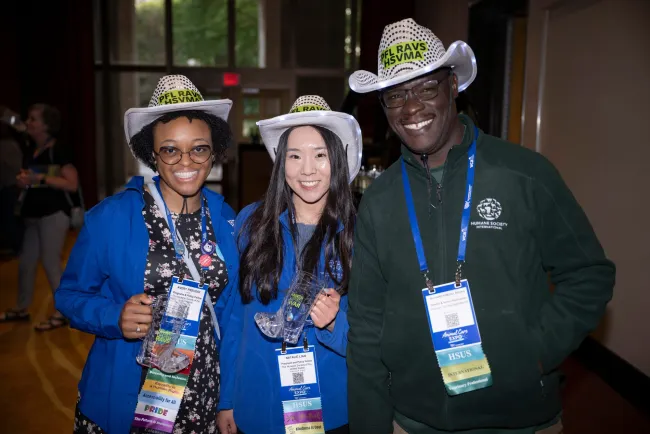
Darren Abate
At Humane World for Animals, inclusion is one of our core values, and creating a world-class working environment where everyone feels welcome and a sense of belonging is central to our mission. We are committed to building an organizational culture rooted in fairness, opportunity and respect for all individuals.
Our efforts to foster an inclusive and empowering workplace include:
- Expanding career opportunities: Our paid internships and fellowships provide a pathway for college students and mid-career professionals to gain valuable experience and build careers in animal protection, expanding access to the profession across a wide range of backgrounds and lived experiences.
- Advancing pay transparency: We are committed to ensuring equitable pay and advancement opportunities by tracking metrics across departments and evaluating outcomes to ensure fair treatment and access for all employees.
- Broadening leadership representation: We strive to ensure that diverse perspectives, experiences and backgrounds are reflected across all levels of the organization, including leadership roles and the board of directors.
- Elevating employee voices: Through our annual culture survey, we gather insights directly from staff to understand workplace satisfaction, reinforce our inclusive workplace culture and identify areas for improvement. In the 2023 survey, Humane World for Animals scored above U.S. benchmarks for belonging, inclusion, authenticity, non-discrimination and respectful treatment. Employees report feeling a strong sense of belonging, comfort in bringing their full selves to work, and confidence that diverse perspectives are valued and respected.
We are proud of the progress we have made and remain committed to creating a workplace where every employee feels empowered, valued and supported.
